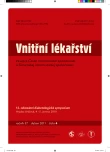-
Medical journals
- Career
Colorectal cancer and diabetes
Authors: Š. Svačina
Authors‘ workplace: III. interní klinika 1. lékařské fakulty UK a VFN Praha, přednosta prof. MUDr. Štěpán Svačina, DrSc., MBA
Published in: Vnitř Lék 2011; 57(4): 378-380
Category: 12th national Symposium diabetes, "Diabetes and Gastroenterology", Hradec Kralove, 4 to 5 June 2010
Overview
Colorectal carcinoma is a tumour with higher incidence in patients with type 2 diabetes and obesity. Recently, a slightly higher risk has also been shown in prediabetic states. The most important latest finding is that of a reduced risk in patients treated with metformin; there is a trend now to also prescribe metformin in patients with disturbed glucose tolerance or increased fasting glycaemia. Regular physical activity and reduced animal fat intake with increased intake of fruits and vegetables may help to prevent the disease. Pathogenesis may include changes to intestinal flora. The most important current preventive clinical measure is colonoscopy. Type 2 diabetes patients should be considered as a risk group and thus prevention should be targeted at these patients.
Key words:
metabolic syndrome – type 2 diabetes mellitus – colorectal cancer – prediabetes – metformin
Sources
1. Svačina Š et al. Metabolický syndrom. Praha: Triton 2006.
2. Svačina Š. Nádory ledvin, močového měchýře a prostaty u obezity a diabetu. Vnitř Lék 2008; 54 : 464–467.
3. Svačina Š, Matoulek M, Svobodová Š et al. Nádory trávicího traktu a diabetes mellitus. Vnitř Lék 2004; 50 : 386–391.
4. Hjalgrim H, Frisch M, Ekbom A et al. Cancer and diabetes – a follow-up study of two population-based cohorts of diabetic patients. J Intern Med 1997; 241 : 471–475.
5. Jonasson JM, Ljung R, Talbäck M et al. Insulin glargine use and short-term incidence of malignancies – a population-based follow-up study in Sweden. Diabetologia 2009; 52 : 1745–1754.
6. Currie CJ, Poole CD, Gale EA. The influence of glucose-lowering therapies on cancer risk in type 2 diabetes. Diabetologia 2009; 52 : 1766–1777.
7. Hemkens LG, Grouven U, Bender R et al. Risk of malignancies in patients with diabetes treated with human insulin or insulin analogues: a cohort study. Diabetologia 2009; 52 : 1732–1744.
8. Diabetologia 2010; 1. České vydání, výběr z časopisu.
9. Giovannucci E, Harlan DM, Archer MC et al. Diabetes and cancer: a consensus report. Diabetes Care 2010; 33 : 1674–1685.
10. Garfinkel L. Overweight and cancer. Ann Intern Med 1985; 103 : 1034–1036.
11. Ford ES. Body mass index and colon cancer in a national sample of adult US men and women. Am J Epidemiol 1999; 150 : 390–398.
12. Hu FB, Giovannucci E. Prospective study of adult onset diabetes mellitus (type 2) and risk of colorectal cancer in women. J Natl Cancer Inst 1999; 91 : 542–547.
13. La Vecchia C, Negri E, Decarli A et al. Diabetes mellitus and colorectal cancer risk. Cancer Epidemiol Biomarkers Prev 1997; 6 : 1007–1010.
14. Meyerhardt JA, Catalano PJ, Haller DG et al. Impact of diabetes mellitus on outcomes in patients with colon cancer. J Clin Oncol 2003; 21 : 433–440.
15. Ren X, Zhang X, Zhang X et al. Type 2 diabetes mellitus associated with increased risk for colorectal cancer: evidence from an international ecological study and population-based risk analysis in China. Public Health 2009; 123 : 540–544.
16. Currie CJ, Poole CD, Gale EA. The influence of glucose-lowering therapies on cancer risk in type 2 diabetes. Diabetologia 2009; 52 : 1766–1777.
17. Zhou XH, Qiao Q, Zethelius B et al. DECODE Study Group. Diabetes, prediabetes and cancer mortality. Diabetologia 2010; 53 : 1867–1876.
18. Noh GY, Hwang DY, Choi YH et al. Effect of diabetes mellitus on outcomes of colorectal cancer. J Korean Soc Coloproctology 2010; 26 : 424–428.
19. Holcátová I, Svačina Š. Dieta v prevenci a léčbě nádorových onemocnění. In: Svačina Š (ed.). Klinická dietologie. Praha: Grada 2008 : 265–277.
20. Tlaskalová-Hogenová H, Stěpánková R, Kozáková H et al. The role of gut microbiota (commensal bacteria) and the mucosal barrier in the pathogenesis of inflammatory and autoimmune diseases and cancer: contribution of germ-free and gnotobiotic animal models of human diseases. Cell Mol Immunol 2011; 8 : 110–120.
Labels
Diabetology Endocrinology Internal medicine
Article was published inInternal Medicine

2011 Issue 4-
All articles in this issue
- Diabetes mellitus and the oral cavity
- Xerostomia, hyposialia, sicca syndrome – quantitative disturbances of the salivary flow rate
- Peptic ulcer disease in patients with diabetes mellitus
- Motility disorders and gastric emptying in diabetes mellitus. Current diagnostics and treatment
- Current trends of surgical therapy of focal liver and pancreatic lesions
- Steatosis and steatohepatitis in diabetic patient
- Diabetes mellitus and the liver cirrhosis
- Acute pancreatitis in diabetics
- Coeliac disease and diabetes
- Colorectal cancer and diabetes
- Analogues of amylin, α-glucosidase inhibitors and the digestive system in homeostasis regulation
- Autonomic neuropathy of the gastrointestinal tract
- Dyspeptic syndrome associated with antidiabetic therapy
- Metabolic surgery – the most effective diabetes treatment
- Metabolic surgery – a new approach to the management of selected diseases
- Incretin hormones
- Treatment of type 2 diabetes mellitus with GLP-1 antagonists
- Incretin therapy and the metabolic syndrome
- Internal Medicine
- Journal archive
- Current issue
- Online only
- About the journal
Most read in this issue- Xerostomia, hyposialia, sicca syndrome – quantitative disturbances of the salivary flow rate
- Treatment of type 2 diabetes mellitus with GLP-1 antagonists
- Autonomic neuropathy of the gastrointestinal tract
- Diabetes mellitus and the liver cirrhosis
Login#ADS_BOTTOM_SCRIPTS#Forgotten passwordEnter the email address that you registered with. We will send you instructions on how to set a new password.
- Career

